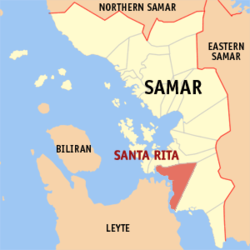Santa Rita, Samar
| Santa Rita | ||
|---|---|---|
| Municipality | ||
| Municipality of Santa Rita | ||

Surtidos Festival
|
||
|
||
 Map of Samar with Santa Rita highlighted |
||
| Location within the Philippines | ||
| Coordinates: 11°28′N 124°57′E / 11.47°N 124.95°ECoordinates: 11°28′N 124°57′E / 11.47°N 124.95°E | ||
| Country |
|
|
| Region | Eastern Visayas (Region VIII) | |
| Province | Samar | |
| District | 2nd district of Samar | |
| Barangays | 38 (see Barangays) | |
| Government | ||
| • Type | Sangguniang Bayan | |
| • Mayor | Joven P. Tiu | |
| • Electorate | 24,877 voters (2016) | |
| Area | ||
| • Total | 411.77 km2 (158.99 sq mi) | |
| Population (2015 census) | ||
| • Total | 41,591 | |
| • Density | 100/km2 (260/sq mi) | |
| Time zone | PST (UTC+8) | |
| ZIP code | 6711 | |
| PSGC | 086017000 | |
| IDD : area code | +63 (0)55 | |
| Climate type | tropical rainforest climate | |
| Income class | 3rd municipal income class | |
Santa Rita, officially the Municipality of Santa Rita, is a 3rd class municipality in the province of Samar, Philippines. According to the 2015 census, it has a population of 41,591 people.
Santa Rita is connected to Tacloban and Leyte Island by the San Juanico Bridge.
Santa Rita is a town known but to a few people of Samar. However, in a few years, the San Juanico Bridge will be completed. This multi-million bridge will be a water link between Tacloban City at one end and Santa Rita at the other. This link, which is the Philippine-Japan Friendship Highway, formerly known as the Philippine Highway, is envisioned to connect the entire archipelago from horth to south, facilitating travel and communication between Samar and Leyte and the provinces of Luzon and Mindanao. The tiny island between Samar and Leyte, known to many people as Tabucan Island, became the first site of poblacion. Local tradition dates the founding of the town to the early part of the eighteenth century. No historical records however and whatsoever could be found. The early settlers, according to the aged inhabitants, were the tribes of Agoy, Amistoso, Lacambara clans. Joaquin Amistoso rose to be their leader. San Juanico Strait was supposed to have been named in his honor. The people made their living by small-scale fishing. In 1800, Capitan Bartolome Sanchez, the head of the Spanish Expedition, was enticed by the people's friendliness and stayed to help the people of the island. He called nearby tribes to unite with them and made Joaquin Amistoso as Cabeza de Barangay. The ruin of the watch tower locally called Barawalti, are mute evidence of Moro raids. A fleet of moro vintas defeated Capitan Tiago and men. This fleet was headed by the famous Sultan Kudarat. Some of the people escaped to the marshy shores of the mainland of Samar. These refugees founded a barangay called Lalawiton with peril Lacambra as their capitan. The site of Lalawiton is the present site of the poblacion. In 1863, the municipality of Santa Rita was officially recognized by the Spanish authorities. Before that time it belonged to the Municipality of Basey, Santa Rita was reverted to its former status as a barangay of Basey from 1904 to 1906. Pedro Amistoso was elected as municipal president in the first local election held in 1908. Succeeding him were Mamerto Ilagan, 1910; Alipio Ragarit 1912; Inocencio Hilvano 1916; Florentino Nerviol, 1928; and Margarito Caberic 1932–1940. Conrado Adolfo was elected municipal mayor in 1941 but was unable to serve his full-time because of the onset of the Second World War. Florentino Nerviol served as Mayor from 1942 to 1944 and as [PCAU] (Philippine Civil Affairs Unit) mayor to January 6, 1945, and Margarito Caberic succeeded him up to May 31, 1946. Isidro Zeta was appointed mayor until the held in 1947. Succeeding him were Simplicio Lacaba 1948; Pedro Hilvano, acting 1952 and elected in 1956; Gaudencio Espino in 1960; re-elect in 1964 and again Pedro Hilvano elected in 1968 and re-elected in the latest election.
...
Wikipedia


